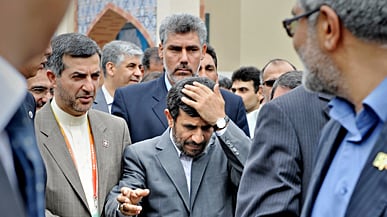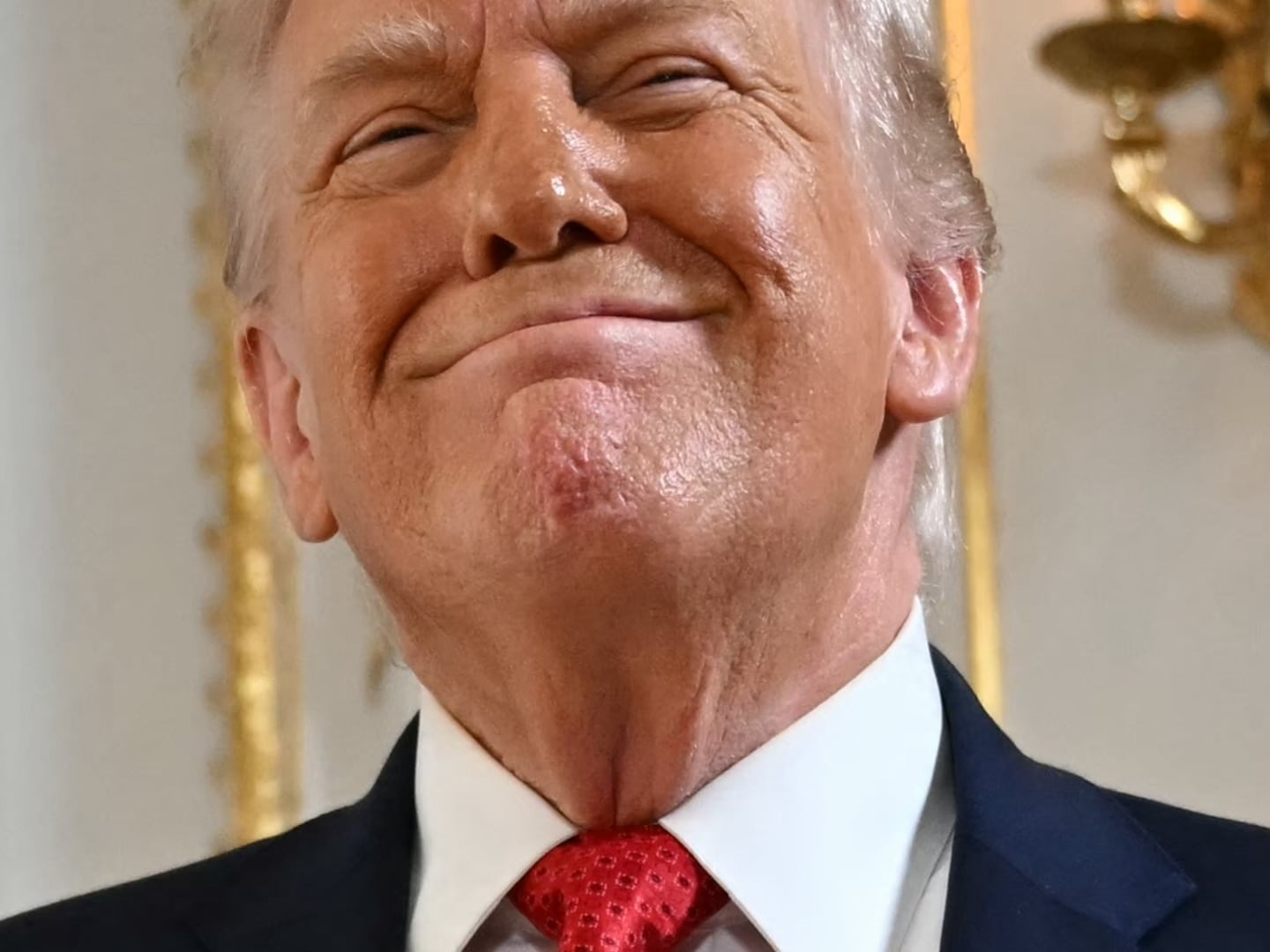Poor Ahmadinejad.
After a lovely week living in a plush New York hotel, basking in the warm glow of television cameras, sitting down with the likes of Charlie Rose and Larry King, and holding court at the United Nations, it’s time to go back home to Iran, where the favorite topic of conversation is not who masterminded the attacks of 9/11, but how much longer Mahmoud Ahmadinejad will last as president before the parliament begins impeachment proceedings.

Don’t let the bluster and confidence fool you: Ahmadinejad is returning to a country in political turmoil, an economy on the verge of utter collapse, and a government in total deadlock. The coalition of military, clerical, and political conservatives that had rallied to him in opposition to the Green Movement has completely fallen apart. Now that they no longer have to contend with an unarmed group of college kids demanding their basic rights, Ahmadinejad’s erstwhile allies have begun focusing all their anger upon him.
In the last few weeks, a number of high-profile members of Iran’s parliament—many of them Ahmadinejad’s former supporters—have openly threatened him with impeachment. The president’s relationship with the parliament has always been strained (there are some half-dozen laws passed by the parliament in the last year that Ahmadinejad has either refused to sign or just plain ignored). But lately the antagonism between the two branches of government has boiled over into open attacks in the press.
Ahmad Tavakoli, one of the most hard-line conservative MPs in the parliament, recently wrote a scathing letter to the president outlining three major violations to Iran’s constitution made by his administration—all of them grounds for “censure” and “impeachment” (Tavakoli actually used those words). According to a published version of the letter, Tavakoli says of the main issues he takes umbrage with is Ahmadinejad’s open disregard for Iran’s supreme leader.
Now that Ahmadinejad’s allies no longer have to contend with an unarmed group of college kids demanding their basic rights, they have begun focusing their anger on him.
Tavakoli is referring to a controversial remark made by Ahmadinejad that the executive branch is the most important branch of government in Iran. On the one hand, the remark was just the latest example of Ahmadinejad’s attempts to grab the reins of power in Iran. Yet his comment was widely interpreted as a direct and public rebuke of the country’s revered founding father, Ayatollah Ruhollah Khomeini, who famously said that the parliament must be the most important branch of the government.
Ahmadinejad’s ties with Ayatollah Khomeini had already been pretty much permanently severed when not one member of Khomeini’s family attended his swearing-in ceremony last year. But after his remarks contradicting the “infallible” father of the nation, a large number of MPs came out strongly against the president, with one conservative member, Ali Mottahari, ominously declaring that the parliament would be “stepping up” its examination of Ahmadinejad’s government. Another MP, Daryoush Qanbari, quipped that the president may not be “fully informed” about how the law in Iran works. But the best retort against Ahmadinejad came from Iran’s fiercely conservative speaker of parliament, Ali Larijani, who reminded the president that the purpose of the parliament was to keep the country from turning into a dictatorship, a not-so-veiled accusation that the president may be confusing himself with the shah. “If Imam Khomeini said [Parliament] has full authority, it was to prevent the reemergence of dictatorship in Iran,” Larijani said.
At the same time, Ahmadinejad is in serious trouble with the country’s clerical elite. As I have written in these pages, ever since his first inauguration as president, Ahmadinejad, with the help of the Revolutionary Guard, has been systematically removing the mullahs from every position of power in the government and replacing them with former or current members of the Republican Guard. His cabinet has ceased attending meetings of the Expediency Council, whose members represent the interests of the clerical elite. Earlier in the year, Ahmadinejad told a Persian-language newspaper that in his opinion, “administering the country should not be left to the [supreme] leader, the religious scholars, and other [clerics].”
Now his loyal Chief of Staff Esfandiar Mashaei has stated that Iran should advance "an Iranian school of thought rather than the Islamic school of thought” outside of the country. That comment raised the ire even of Ahmadinejad’s longtime spiritual mentor—the absolutely nutty Ayatollah Mesbah Yazdi—who replied, “These people are not our comrades; we have no permanent friendship to anyone, but to those who are following Supreme Leader Ayatollah Khamenei and Islam.”
All of this is taking place under the backdrop of unprecedented economic woes in Iran. The uncomfortable truth that Iran’s leaders are loath to admit is that the new round of U.S. and U.N. sanctions targeting Iran’s military and banking industries are taking their toll. Many of Iran’s most reliable European trading partners have begun to pull out of the country, including Germany’s Siemens and the steel company ThyssenKrupp.
“We believe Iran’s leadership was caught off-guard by the speed, intensity, and scope of the new measures,” said Stuart Levey, President Obama’s undersecretary for terrorism and financial intelligence.
Levey may be right. On September 22, Akbar Hashemi Rafsanjani, one of the most powerful men in Iran (certainly the richest), publicly admitted what all Iranians know to be true but few dare say: that the sanctions were having an effect on Iran’s ailing economy “During the [years after] revolution, we have never had so many sanctions and I urge all officials to take them seriously and not as a joke.”
As The Wall Street Journal reports, “Iran’s central bank recently warned of a looming economic crisis and said nearly 2 million personal and business checks bounced in the first three months of the Iranian calendar, up 38 percent from a year earlier.” Inflation in Iran is officially at 10 percent, though many economists believe it to be much higher (probably closer to 24 percent). The Iranian parliament estimates unemployment to be at around 22 percent, but since even one hour a week of official employment counts as full employment this number could be as high as 40 percent. Meanwhile, the IMF estimates that the Iranian economy grew by less than 1 percent in 2009 and is on track to grow by a measly 1.8 percent in 2010.
Now, with sanctions taking their toll and Iranian economists predicting a stock market crash, Ahmadinejad is moving forward with plans to cut key subsidies for petrol, electricity, and other basic goods valued at around $100 billion. Without warning, some Iranians woke up this week to find that their electricity bills had increased 1,000 percent! The government plans on providing direct assistance to families in need to offset the rise in prices. But because Ahmadinejad insisted that he be directly responsible for handing out the assistance, the move has created even more strife with the parliament. Speaking to Mehr News Agency, parliamentarian Mohammad Reza-Khabaz accused Ahamdinejad of not having the knowledge or skill to handle such a complex economic maneuver. “If the administration had implemented this [subsidies] plan during the fist half of the current year, it would have been much easier for both the administration and the people.”
The mounting domestic pressure on Ahmadinejad may work to Obama’s advantage. Ahmadinejad is no fool. He knows his political and economic troubles at home could be disastrous for his legacy. That is why, conspiracy theories aside, his approach to the U.S. was noticeably softer and more accommodating, particularly when it comes to Iran’s nuclear program. Toward the end of his trip, Ahmadinejad made a comment that would have been inconceivable six months ago, saying he would be willing to halt all uranium enrichment in exchange for a comprehensive fuel swap. “We are prepared now as well and I probably would say there is a good chance that talks will resume in the near future,” he said.
Whether his domestic troubles will compel him to be more accommodating in these talks remains to be seen. He may decide at the last moment to call for a U.N. investigation over what exactly happened at Area 51 50 years ago. But if we can just keep the man focused, we may be able to squeeze a deal out of him yet.
Reza Aslan is author of the international bestseller No god but God and Beyond Fundamentalism. His new book Tablet and Pen: Literary Landscapes from the Modern Middle East comes out in Nov. Follow him on Twitter and Facebook.






